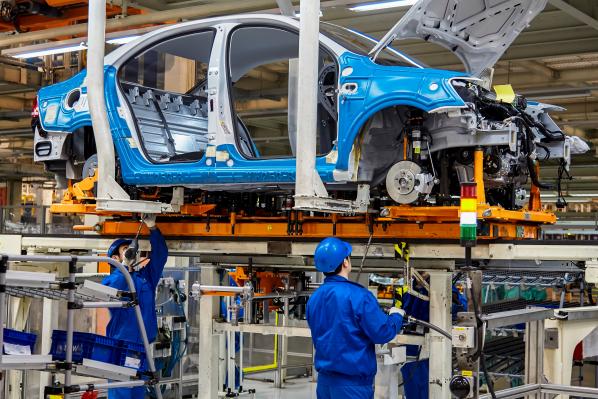
Credit:Jenson/ Shutterstock.com
Letter from the Editors
This month, the Chinese government revealed its Q1 GDP growth, a 5.3 percent increase–beating expectations of 4.8 percent. The value added of manufacturing increased by 6.7 percent. The manufacturing sector is holding up, driven by overseas demand and Beijing’s focus on developing advanced technologies at home, according to a Bloomberg article.
Meanwhile, Chinese workers keep voicing grievances. China Labour Bulletin’s Strike Map recorded 113 workers’ protests in the manufacturing sector among 376 strikes in Q1 2024. One example is the strike in Chongqing Huguang Auto Harness Factory this month. China Labour Bulletin (CLB) looked into the case and found several issues such as excessive overtime, possible abusive use of labour dispatch and violence against workers. CLB is following this case and has already talked to the district and the municipal union hotlines. Please stay tuned for our future report.
Thanks for reading!
CLB Editors
CLB Insights

Credit: Worawee Meepian / Shutterstock.com
As the German Supply Chain Act came into force in 2023, CLB has made use of the Act to voice grievances of Chinese auto supplier workers to the German multinationals. In a recent article, CLB describes the strike cases in auto suppliers in China, summarises the key regulations of the German Supply Chain Act and corresponding promises of the German OEMsThe article further illustrates how the Act can be used to address worker grievances in a case.
The auto industry is worth investigating, as it involves a large number of suppliers in multiple tiers. In 2023, CLB recorded 11 strike cases in auto suppliers in China. Four of the factories supply for German OEMs, and causes of protests include relocations, overdue payments and contaminated food. CLB followed up on the strike case of Aleph Electronics Factory (an auto parts factory in Shenzhen) by urging Volkswagen (VW) to investigate the labour violations involved. Contrary to the belief that large conglomerates like VW would dismiss the case of their suppliers as not within their control, VW’s human rights commissioner wrote back and said they would initiate the investigation process. The communication is still ongoing.
For more on the grievance cases in the manufacturing sector in China and CLB’s approach in leveraging company promises and the Supply Chain Act, readers can refer to our new report – Bridging Workers' Rights in China’s Manufacturing Sector with Global Supply Chain Tools: A Case-Oriented Approach.
Workers’ Representation
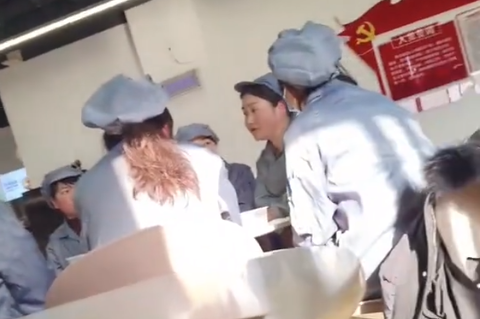
Photo: Shanghai Amphenol workers discussing compensation. Source: internet
The case of Shanghai Amphenol centred on severance pay. The company was relocating to another province and laying off its workers. Workers believed that the compensation plan was substandard. Even though the company claimed to offer a compensation plan of the legally required "N+1" times average monthly salary (where "N" represents the number of years employed), workers’ overtime pay was excluded from the average monthly salary. This resulted in a huge gap between the company’s offer and workers’ expectations.
Workers said a lawyer from the union came once to assert that overtime pay, according to the regulation in Shanghai, should not be included in the severance pay. Pressured by the deadline given by the company, the lawyer's conclusion made a final push for workers to accept the company’s proposal.
As CLB believed that there was ambiguity in the calculation of layoff compensation, we called the Union Policy Hotline for Shanghai Workers to inquire about the incident. Instead of answering the questions, the staff said they could transfer the call to the union's lawyer. When asked about the union's view on the issue, the staff replied, "there is no document about this issue", and "it needs to be confirmed with the Labour Bureau". After conducting research, the staff found that the Labour Bureau specified that overtime pay should not be included in the calculation of compensation, and suggested that if there are any doubts, one should seek clarification from the Labour Bureau.
The union, which is obligated to represent the workers, should have intervened more actively. CLB believes the Shanghai Federation of Trade Unions could raise questions to the Labour Bureau on behalf of the workers and seek explanations regarding compensation calculations, so as to better address workers' concerns. Moreover, as Amphenol supplies to multinationals such as Siemens, the union should leverage the German Supply Chain Act to address labour disputes.
Workers’ Voices
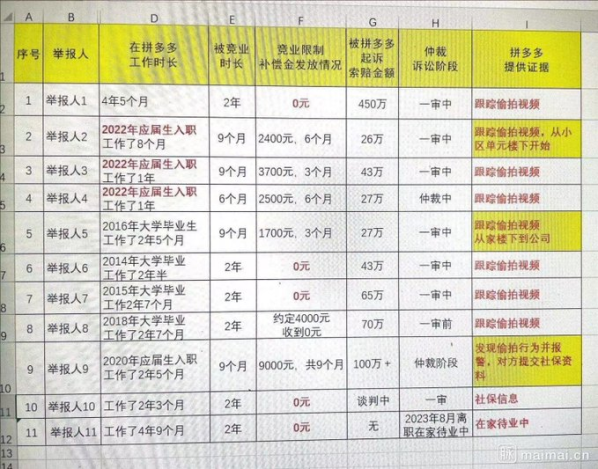
Photo: Eleven workers joined together to collectively expose this practice and their experiences. Source: Internet
The Pinduoduo case reminds us of the situation employees from Chinese tech sectors are facing. In February, over 10 former employees of Pinduoduo took to social media to report that the company was suing them and seeking sky-high damages over violating non-compete agreements. The revelation has sparked public conversation on whether the e-commerce titan is abusing the law.
The former employee “Grass Girl” shared her story through Weibo. She was hired as a sales and marketing officer by Pinduoduo after graduation, with a basic salary of 8,100 yuan. Eight months into her employment, she left the company after experiencing significant weight loss and health issues due to long working hours and demanding workload. However, the non-compete agreement was enforced upon her resignation, prohibiting her from joining a rival company and compensating her only 2,400 yuan per month during a nine-month period.
When “Grass Girl” joined another company within the timeframe, Pinduoduo initiated a labour arbitration case against her. The ruling favoured Pinduoduo, and Grass Girl was ordered to pay damages, lawyers' fees, and return the compensation received during the non-compete period, amounting to a total of 280,000 yuan, nearly four times her earnings during employment. She wrote in her post:
“I feel that life has no hope. If I die, will Pinduoduo let me go? Does the debt need to be paid by my parents?”
According to China’s Labour Contract Law, employees who may be subject to non-compete obligations include not only “senior management and senior technical personnel'', but also those who have “confidentiality obligations”. The latter clause is believed to be exploited to target low and middle level employees, including recent graduates. The terms of these agreements are accused of being excessively stringent and greedy.
CLB believes that trade unions in China should collectively negotiate with employers regarding the duration and damages of non-compete agreements, monitor the possible abuse of clauses, and provide legal assistance to workers when needed. Additionally, unions should also advocate for legislative and judicial reforms, such as reducing the enforcement period from the current 24 months.
Strike Action
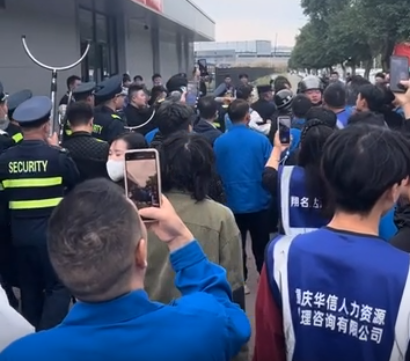
Photo: Workers protest at Chongqing Huguang Auto Harness Factory. Source: Internet
Workers strikes and protests continue. In March 2024, CLB’s strike map recorded 93 incidents, mirroring February's figure of 92 incidents. The construction industry and the manufacturing industry, with 34 and 38 incidents respectively, saw the most workers’ protests. The electronics sector (10 incidents) and textile and garment sector (8 incidents) make up 50 percent of the whole manufacturing workers' protests. Wage arrears and factory relocations were still workers’ primary grievances. The map also recorded four protests in the metallic products and plastic manufacturing sector, as well as two protests related to unpaid wages in automotive parts factories.
Workers protested against mandatory unpaid leaves and unfulfilled bonus promises at Chongqing Huguang Auto Harness Factory. On March 25, hundreds of workers from Chongqing Huguang Auto Harness Factory gathered to protest against the lack of work assignments, which would disqualify them from the promised bonuses due to not completing the required working hours. In videos shared by the workers, police officers used shields to push and shove the protesting workers, and some workers were brought down to the ground.
According to online information, a large number of temporary workers were recruited through labour agencies and attracted by the generous bonuses of 5,000 yuan upon fulfilling the designated working hours. However, the factory quickly stopped assigning work to the workers and started to implement mandatory unpaid leaves, making it evident that the workers would not receive bonuses.
A former worker at Huguang also commented that due to the fear of getting fired, workers often had to work for 13 to 14 hours per day to meet the production requirements. The excessive working hours at Chongqing Huguang violated the labour law's regulations, while the factory also failed to comply with the legal limits on the ratio of dispatched workers. CLB will follow up on this issue later this month.
Workers’ Requests for Help

Credit: chinahbzyg / Shutterstock.com
Downgraded from employees of a provincial hospital to that of a county hospital, over 300 Changsha healthcare workers seek help. According to a report by Southern Weekly, the termination of a government’s cooperative hospital project has resulted in a shift of employment status for 366 healthcare workers. In 2017, Changsha County government collaborated with Hunan Provincial People's Hospital to establish Changsha County People's Hospital, operating under the name of the provincial hospital. As part of this collaboration, over 500 employees were hired as employees of the provincial hospital and sent to the county hospital.
However, due to reasons such as the pandemic and financing, the county hospital has yet to commence operations, and all the staff were informed that the cooperative project was terminated and they were no longer employees of the provincial hospital in early 2024. The significant disparity in benefits and development opportunities caused discontent and anger among workers, and they set out to seek assistance from the government and media.
The family of a Foxconn worker seeks help online over work injury compensation after the worker’s death. According to the family member’s post, 31-year-old worker Li felt unwell and was sent to the hospital while working a night shift on 7 April 2023. He later passed away due to a cerebral infarction. The worker was employed at Foxconn's subcompany Fuyu Electronic Technology (Huai'an) Co., Ltd. The worker’s death was not deemed work-related, as it was determined that the time of death occurred more than 48 hours after being sent to the hospital. A year later, the worker's lawsuit is still ongoing, and the family is seeking more public assistance.
CLB in the News
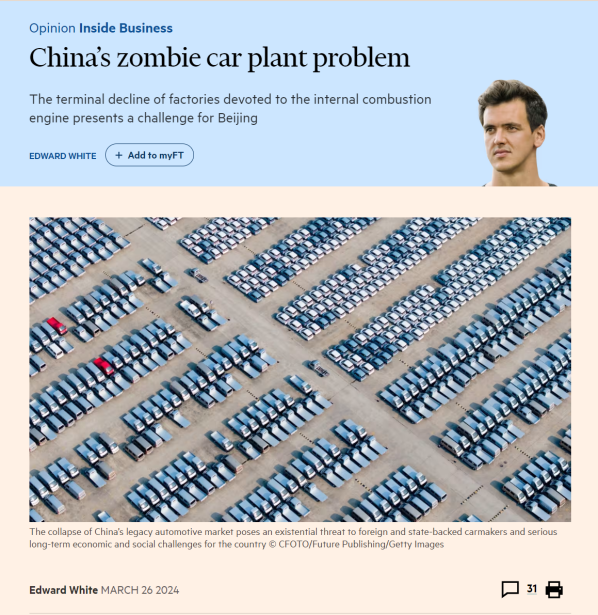
China Labour Bulletin was cited in an opinion piece published by Financial Times. The author, Edward White, pointed out that the transition from internal combustion engine cars to electrical vehicles poses challenges to the legacy car makers, while also presenting serious long-term economic and social challenges for the country. There is now an overcapacity problem in the industry that “must be tackled to achieve further economic recovery”. Data from China Labour Bulletin’s Strike Map showed that more than 60 protests had been organised by auto workers over the past five years.
